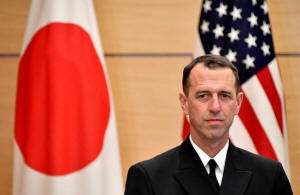|
After deadly crashes in Pacific, U.S.
Navy refocuses on leadership
 Send a link to a friend
Send a link to a friend
 [April 11, 2018]
By Idrees Ali [April 11, 2018]
By Idrees Ali
NEWPORT, R.I. (Reuters) - After a pair of
crashes involving U.S. Navy ships in the Asia-Pacific killed more than a
dozen people last year, the Navy's efforts to develop its leaders is
receiving renewed attention.
Last week, the Navy inaugurated the College of Leadership and Ethics at
the U.S. Naval War College in Rhode Island.
Seventeen sailors were killed last year in two collisions with
commercial vessels involving guided-missile destroyers, the Fitzgerald
in June off Japan and the John S. McCain in August as it approached
Singapore.
The commanding officers of the Navy destroyers involved in the
collisions face courts-martial and military criminal charges. Charges
against them include dereliction of duty, hazarding a vessel and
negligent homicide.
A series of Navy investigations found rising pressure to meet demands
for more and more Navy operations, particularly in the Pacific Ocean,
led those in command to rationalize declining standards that ranged from
basic seamanship to operational safety.
Some observers, including lawmakers during a congressional hearing, have
been critical of the Navy's handling of the incidents.

Navy officials acknowledge that the inauguration of the new college
alone will not be enough and a change in culture will take time.
Chief of U.S. Naval Operations Admiral John Richardson said the
incidents in the Pacific reinforced the need for a closer look at
leadership training, something officials say was in the works prior to
the crashes.
"As we've come through the collisions, the investigations focused on the
accountability and in some cases discipline; it has just become clear
that you can't emphasize and focus on it too much," Richardson told a
small group of reporters.
[to top of second column]
|

Admiral John Richardson, Chief of U.S. Naval Operations, waits for
Japan's Prime Minister Shinzo Abe before their meeting at the Prime
Minister's official residence in Tokyo, Japan, 18 December 2017.
REUTERS/Franck Robichon/Pool

Rear Admiral Jeff Harley, president of the Naval War College, said
that in a break from the past, the new college would teach
leadership courses throughout the year.
"One (issue) that has perhaps not been given the attention that is
required, (and) we're starting to understand that its required on a
more continuous basis, is this idea of character competency," - or
leadership development, Harley said.
Another reason for increased focus on leadership is the expectation
that the Navy will play a larger role in operations in the years
ahead.
The U.S. military has put countering China and Russia at the center
of a new strategy unveiled earlier this year.
"The Navy really kind of has unique and specific roles in making all
that happen, not only from a security standpoint, but also sea
lanes, keeping access to markets open," Richardson said.
(Reporting by Idrees Ali; Editing by Dan Grebler)
[© 2018 Thomson Reuters. All rights
reserved.]
Copyright 2018 Reuters. All rights reserved. This material may not be published,
broadcast, rewritten or redistributed.
Thompson Reuters is solely responsible for this content.
 |